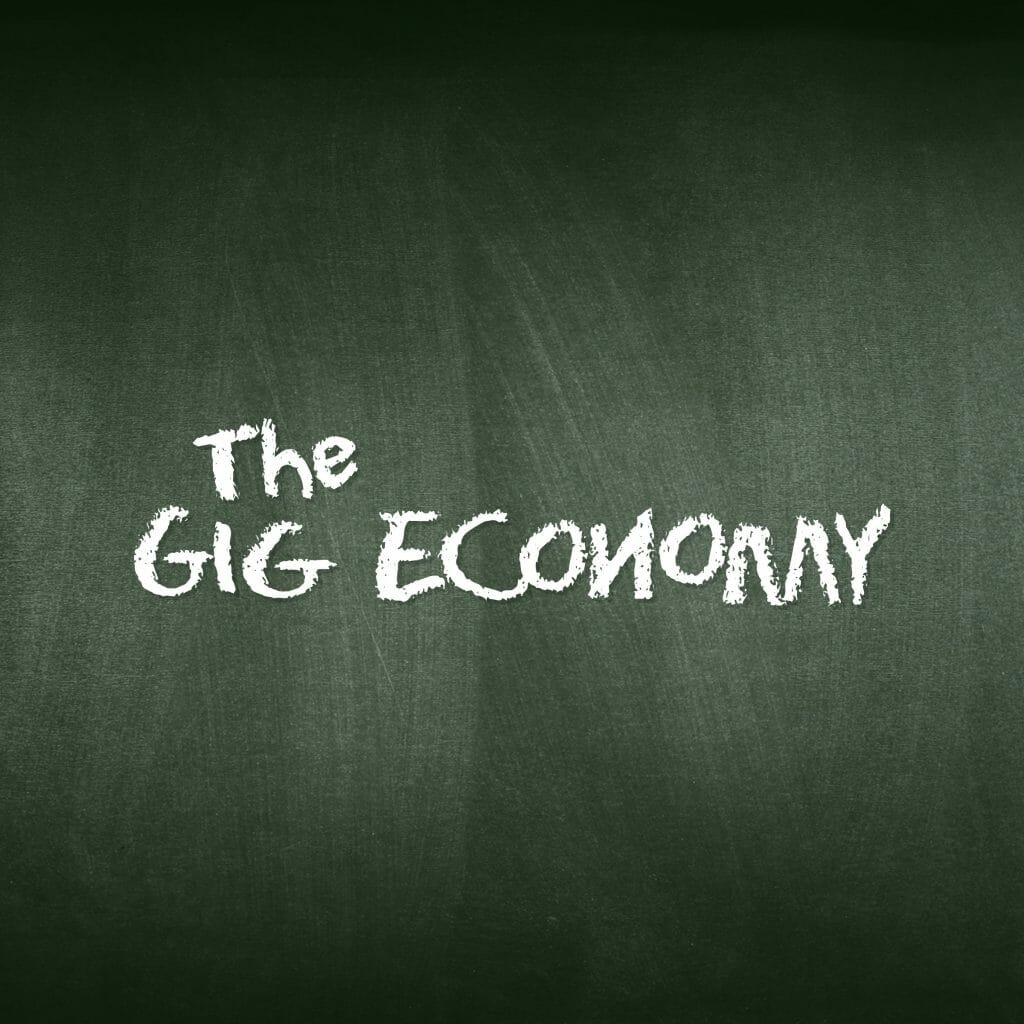gig e-con-o-my
noun • “A labor market characterized by the prevalence of short-term contracts or freelance work as opposed to permanent jobs.”
Most businesses don’t think that they fit this description. However, as markets become more unpredictable, many different companies are faced with working this way.
Balancing your labor variable just makes sense.
In the decorated apparel industry, the gig economy working class surrounds us. You know them too. Let’s take a peek:
- Have you ever hired a freelance artist?
- Have you ever outsourced your digitizing for embroidery?
- Have you ever used a temporary worker agency?
- Have you ever had an electrician, plumber, carpenter, or machine tech fix something “after hours” to save a buck or two?
- Have you ever used someone to help build your webpage?
- Have you ever had someone write a blog article or pay them to post content for your social media?
- Have you ever outsourced some garment relabeling work to a seamstress?
- Do you pull in more workers for seasonal help such as in the summer or Christmas holiday boom?
- Have you ever brought your kids or relatives in to help clean screens or catch shirts when you are really busy? Always the favorite.
- Do you use a bookkeeper or accountant to review your financials? What about a lawyer?
- What about a recruiter? Tons of industry positions open up every day and need to be staffed. (here’s a great one: Textile Staffing Link)
- How about me? I do decorated apparel industry coaching constantly for shops. But I’m not really on anyone’s permanent payroll.
Any occupation in which workers may be hired for on-demand jobs has the loaded potential for gig employment. To tell you the truth, I think that this type of employment is steadily growing. Recently the McKinsey Global Institute posted that in the US and Europe there are 162 million workers that have some sort of gig economy job. That’s 20%-30% of the entire workforce. Quite the chunk.
You see it now in business insider-site headlines about drivers that want to work for Uber or Lyft. That’s a gig economy job.
Where nothing existed like this five years ago, now you have an entire wave of workers willing to essentially become independent taxi cab drivers. Why didn’t they want to drive for the taxi companies before? Simple. All the power rested with the taxi company and not the driver.
Recently I used Uber to get to the airport from a client’s office. I asked the driver, Anthony, his thoughts on the work. He said, “It’s great. I’m my own boss. I work when I want. Make the money I need for the day. When I’ve had enough I just quit, take a nap, and then get back to what I really want to do which is create music.”
The secret to this section of the gig economy is that the control resides in the worker. He/she has 100% control of what they do, when they do it and who they do it for. For them, this fits their lifestyle choice for the work.
Someone posted on an industry Facebook group I belong to that they wanted to be a freelance t-shirt printer and just travel the world. Six months or so in one city and then off to somewhere else to learn what life is like there.
What an awesomely brave idea.
Successful gig workers like the control they have over their lives. Want to go for a run at 10:00 in the morning? Just do it. The day becomes more about the work, and less about when you are actually doing the work. It’s not necessarily confined to a 9 to 5 job schedule.
Let’s not forget the fact that many decorated apparel shops started off as a gig economy side job operating out of a basement or a garage, before they ever blossomed into a mainstream “real” businesses. You gotta start somewhere.
The biggest problem for most gig workers is the uncertainty of what’s around the corner. Getting a steady stream of work is extremely difficult. Most gig economy workers spend just as much time tracking down their next opportunity as they do working the ones in front of them. Sometimes more.
This means that quite often that it’s hard to turn the gig into a full time career. It’s a struggle. And if you aren’t working? Zero pay. Sorry, no soup for you.
However, it’s not all doom and gloom. As independent contractor or freelance business opportunities become more mainstream, it may be easier to find new opportunities. Usually this starts with a few successful finished contracts, and then as referrals come in, more business can swing your way.
For Gig Economy Workers, “Hey, I’m a Freelancer!”:
Here are some tips if you are considering doing something interesting with your career:
- Network. It pays to know people, especially those that may need your services. This usually means locally, but don’t forget to use your social media contacts too. Find a few people that can champion your services and keep them abreast of what you have been doing. You have to keep doing this. Whether you are an artist, web developer, software engineer, machine service technician, digitizer, embroiderer or printer…you need to meet a large number of people so they know you exist.
- Ask questions. Don’t be afraid to ask questions, especially of those doing the work you are wanting to try. What do they charge? How do they get paid? What has been the biggest problem? Some might not want to share, but most will. Look online in forums, Facebook groups or other sources for inspiration. This industry constantly amazes me with the generosity of the information. Even to competitors.
- Research. Like any business, write your plan on how you are going to succeed. What do you need? What makes the most sense? Who are your customers and how will they do business with you? Write everything down and build a business plan.
- You may also want to check out the governmental Bureau of Labor Statistics to see info on trending jobs. Here’s a link to the Occupational Outlook Handbook which compiles statistics from the US census.
- Want to start a small business as a freelancer or other gig economy type business? Use SCORE to get started and create your plan.
- Branding. Learn how to differentiate yourself from others. What is going to make you different? While you might not need a logo, you will need to come across as a professional. What documentation or information will you routinely need to share? Will you need a business card or a rate sheet? Get those made and have them ready to hand out. Don’t forget to tune up your resume too. Being professional equates to being ready.
- Use social media. Find the channels your gig customers share and then market yourself online there. Social media means you need to be social. Read, share or like what your clients post. Use the private messaging feature to introduce yourself. You want to create as much dialog with your customers as you can. This helps drive your engagement, which leads to more gigs to complete.
- Use online tools such as the mainstream Behance, Pinterest, Instagram, Twitter, Facebook and LinkedIn.
- Don’t forget about more esoteric online gig economy choices. Freelancer.com, Toptal, & Upwork are some top sites that link workers with companies with needs.
- Maybe you just need some help with funding to push your creative awesomeness. Many artists are now using sites like Patreon to help get the financial aid they need to get those projects built and live.
- You have to show people what you do. Machine repair tech? Have plenty of pictures of you crawling under a press. Artist or webpage designer? Better have a great portfolio. People need to see examples to build trust. “Oh yeah, he does that!” is the reaction you want.
- Work in more companies. I know plenty of screen-printers or embroiderers that work the day shift in one company and part time night shift in another. Some even have deals worked out that they can use the equipment on the weekends for their own apparel line. For them, it’s a necessary mercenary/financial decision. More effort equates to more pay at the end of the week. Are you willing to put that extra time in?
- Get referrals. The secret is to constantly get in front of people that could direct some traffic your way. These are usually on the manager or owner level, but influential staff members can hold sway as well. Just ask. “Hey, I do this. Know anyone who might need it?” You have to ask. Nobody sells you better than you.
- Start a Company. These days it isn’t too difficult to start a small company. Create a name, file with your state, get a tax ID number and create your own LLC. Keep good records and you can deduct your expenses. There are tons of online legal assistance sites like LegalZoom or RocketLawyer. Cheap and fast. You don’t need to recreate the wheel usually.
Welcome to the Dark Side
Of course there is a rougher and darker side to this coin too. Many people are pushed into this type of work due to circumstances out of their control.
In many areas, jobs aren’t as prevalent or easy to come by as in others. This may mean that some people take what they can get, even if it’s not a good long term fit for them career wise. People have bills to pay, so they work to be responsible. Do you have folks like this in your shop?
I don’t think anyone ever sets out to be a t-shirt printer or an embroiderer. However, a lot of great people have made wonderful careers out of “just helping out one day”.
Maybe they just migrated into this industry by the back door. Believe it or not, my original plan was to be an architect. I started a t-shirt company to pay for the tuition, books and supplies. A few decades later and I’m still learning new things every day. Which is probably the most fantastic thing about the decorated apparel industry. It is a never ending journey.
I don’t know if that’s public knowledge though.
Shop Challenge
Here’s a challenge for you. Do you have someone on your staff now that just seems to be marking time until something better comes along? You know what I’m talking about.
What do they do for you?
What if you developed a career path and training program for your shop? A to Z, soup to nuts, everything someone needs to know. Chances are if you showed them that the entry level job is just a starting point to a bigger and brighter future. They might just apply themselves and begin to grow roots with your company if you showed a little more interest in their development. Paint the picture of what they could do and what it might mean for them.
Your absolute best worker five years from now could be this person that seems incredibly lost today.
Not all people are in the gig economy by choice. Your entry level workforce doesn’t have to keep holding onto the revolving door handle either. Can you help them earn their stripes on your team and scale their skill set? I bet you can.
Have that conversation.
.
“It is better to travel well than to arrive.” – Buddha
“The noblest search is the search for excellence.” – Lyndon B. Johnson
“To improve is to change; to be perfect is to change often.” – Winston Churchill
.
Thanks for reading! Please take the poll below and don’t forget to share this article on your social media channels!
[polldaddy poll=9661406]





3 comments
Mark Wells
At Prairie (www.prairietraders.com) we believe in the benefits of the Fairtrade movement and also what is “fair” across the board including the developed west. Our take on the “gig economy” is that it’s never fair nor good for those doing the actual work.
The “gig economy” is is a con by big business (and not so big business) to lower workers wages and conditions ie no paid holidays, sick leave, working conditions, hours, pension contributions, provide your own equipment etc by treating workers as “contractors” whether they like it or not.
Fine if you’re the business but how does a worker (especially one with a family) plan how to pay next month’s rent/mortgage, food, medical bills etc on the basis of “we will pay you if there’s any work”. Fine if the wages are generous enough to cover the down time but generally speaking they are not unless your a professional or have your own business. The so called “gig economy” is a stunt to turn real jobs into “part-time” positions when they are plainly not.
Comparing part-time positions to the “gig economy” also doesn’t cut it with us. Those are part-time positions and not full-time ones where normally there are normal 8 hour, 5 days a week hours. The gig economy was brought about to lower wages etc of workers so if they stood up for better pay, conditions etc then they wouldn’t be rostered on.
I stand with the cab drivers, plumbers etc who are now taking stands against this attack on the working and now middle classes.
Don’t get me started on internships… 🙂
This article is well worth a read http://www.irishtimes.com/business/work/workers-take-fight-against-gig-economy-disrupters-to-court-1.2873590
atkinsontshirt
Thanks for reading and commenting Mark! Love your take and commitment! So obviously you never use freelancers or outsource for art, digitizing, web design, etc? -M
Carol
Another great one!!!